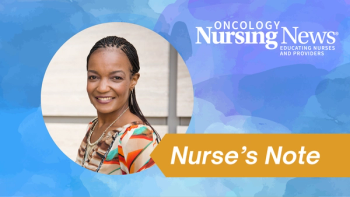
- December 2011
- Volume 5
- Issue 8
Advanced Cancer Care: Is It Real Care if It Comes Too Late?
People with advanced cancer should be told what end-of-life care choices are available earlier in the course of their disease.
Lisa Schulmeister, RN, MN, APRN-BC, OCN®, FAAN
Editor-in-Chief OncLive Nursing
Oncology Nursing Consultant, Adjunct Assistant Professor of Nursing Louisiana State Health Sciences Center in New Orleans, Louisiana
In January 2011, the American Society of Clinical Oncology (ASCO) published a policy statement on end-of-life care. The authors of the statement noted that care for these patients should include an individualized assessment of the patient’s needs, goals, and preferences. They cited evidence that suggested that realistic conversations about prognosis, the potential benefits and limitations of disease-directed therapy, and the potential role of palliative care, either in conjunction with or as an alternative to disease-directed therapy, occurred late in the course of illness or not at all. It is ASCO’s vision that communication with patients with advanced cancer is improved and that patients are referred for hospice or palliative care earlier. Accordingly, in conjunction with its statement, ASCO released a comprehensive guide for patients with advanced cancer (available to download at
These steps are encouraging. People with advanced cancer should be told what end-of-life care choices are available earlier in the course of their disease. But is this happening? The ASCO policy statement has been out for about a year, yet I’m hearing too many stories of patients who were only told about palliative care and/or hospice when they were very near the end of their lives. One oncologist told me that he does not refer any of his patients for palliative care because it “only makes the patient depressed” and takes away hope.
Oncology nurses are the ones who see the flip side; we care for the patients and families who often are stunned when the patient’s symptoms intensify and the family is left to their own resources to cope and manage the symptoms. I often wonder how much better the patient’s quality of life would have been if only palliative care had been offered sooner.
Patients need to be empowered and need to know that there are many ongoing and end-of-life care options available to them. The ASCO policy authors estimated that fewer than 4 in 10 patients with cancer are having candid discussions about all of their treatment options.
Part of the confusion about palliative care and hospice is that patients and their families generally don’t understand these terms. A common misconception is that a hospice is a physical place, as opposed to a specialized type of care. When oncology healthcare providers talk about the services and care (eg, care focused on managing symptoms, care in the patient’s home, nurses visiting the home), patients and their families are often more receptive and interested in palliative care and hospice services.
In some settings, palliative care referrals are made earlier rather than later when criteria for referral are met. For instance, a patient with advanced disease with functional decline, weight loss, loss of appetite, etc, would be eligible for a palliative care referral either by self-identifying the need for a referral, or via referral from a healthcare provider.
Interdisciplinary rounds also help educate staff about palliative care and hospice. Interdisciplinary rounds identify patients with advanced cancer who may benefit from palliative care and hospice services, and benefit earlier rather than later.
“
I often wonder how much better the patient’s quality of life would have been if only palliative care had been offered sooner. ”
—Lisa Schulmeister, RN, MN, APRN-BC, OCN®, FAAN
There are also significant cost savings associated with hospice care: hospice care at home costs about $200 per day, compared to $8000 or more for acute care.
The recommendations from the ASCO policy are still current and include the mandate that quality of life needs to be a priority in advanced cancer care. Oncologists need to talk with patients with advanced cancer about their prognosis and palliative care/hospice options. Lastly, the ASCO policy authors state that patients with cancer—even those with advanced disease—should be referred to clinical trials when indicated and desired.
Reference
Peppercorn JM, Smith TJ, Helft PR, et al. American Society of Clinical Oncology Statement: Toward Individualized Care for Patients With Advanced Cancer. J Clin Oncol. 2011;29(6):755-760.
Articles in this issue
almost 14 years ago
Oncology Nurse Perspectives on Developments in Cancer Carealmost 14 years ago
2011 in Review: NCONN Continues to Change the Face of Cancer Carealmost 14 years ago
Chemo Controversy: An Inside Look at the 'Hot Chemotherapy Bath'Newsletter
Knowledge is power. Don’t miss the most recent breakthroughs in cancer care.




















































































